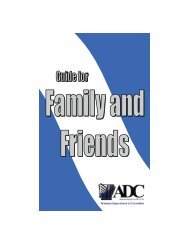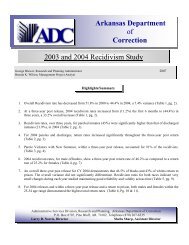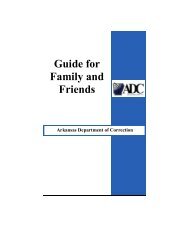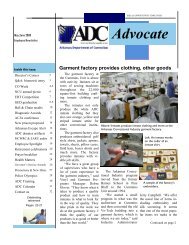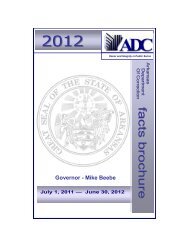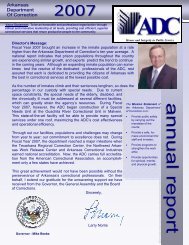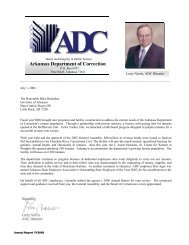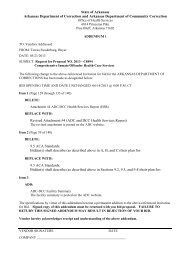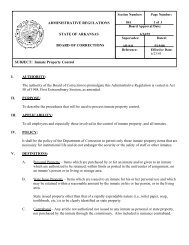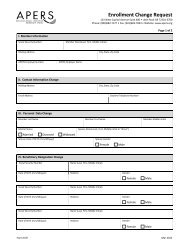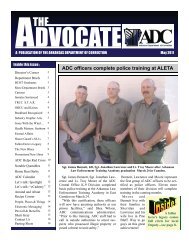Handbook
Inmate Handbook - Arkansas Department of Correction
Inmate Handbook - Arkansas Department of Correction
Create successful ePaper yourself
Turn your PDF publications into a flip-book with our unique Google optimized e-Paper software.
ArkansasDepartmentof CorrectionInmate <strong>Handbook</strong>2015iJuly 2015
iiArkansas Department of CorrectionInmate<strong>Handbook</strong>1st Printing, December 1971 (Revised)2nd Printing, July 1972 (Revised)3rd Printing, November 1972 (Revised)4th Printing, January 1975 (Revised)5th Printing, July 1978 (Revised)6th Printing, May 1981 (Revised)7th Printing, August 1981 (Revised)8th Printing, October 1983 (Revised and Recalled)9th Printing, September 1986 (Revised)10th Printing, February 1991 (Revised)11th Printing, February 1994 (Revised)12th Printing, December 2001 (Revised)13th Printing, May 2006 (Revised)14th Printing, January 2007 (Revised)15th October 2010 (Revised)16th October 2011 (Revised)17th October 2012 (Revised)18th Printing, July 2013 (Updated)19th Printing, August 2013 (Updated)20th Printing, June 2015 (Revised)Printed by Arkansas Correctional Industries
Table of ContentsIntake Process 4Restrictive Housing 23Statutory Responsibilities 5Detainers 23Veterans Benefits and SocialInterstate Compact 24Security 5Medical Services 24Initial Assignments 5Program Services 24Transfers 5Pre-Release/Re-entry 26Classification 5Work Release 26Work & Unit Assignment 6Education 26Following Orders 7Religious Services 27Living in a Prison Setting 7Mail Policy/Packages 27Cleanliness 8Visitation 28Grooming Policy 8Furloughs 30Security Issues 9Commissary 30Property 9Money 31Prison Rape Elimination Act 10Marriage 32Tobacco Regulations 11Law Library 33Inmate Grievance Process 11-12Inmate Groups 33Food Service 12Parole/Transfers and Pardons 33Telephone Use 13Executive Clemency 34Personal Clothing/Property 13Emergency Powers Act 34Disciplinary Process 14-18Legal Assistance 34Behavior Rules/Regulations 18-23Supermax 35iii
4Mission StatementThe mission of the Arkansas Department of Correction is to providepublic safety by carrying out the mandates of the courts; providea safe, humane environment for staff and inmates; provideprograms to strengthen the work ethic; and provide opportunitiesfor spiritual, mental and physical growth.Vision StatementThe Vision of the Arkansas Department of Correction is to be anhonorable and professional organization through ethical and innovativeleadership at all levels, providing cost efficient, superiorcorrectional services that return productive people to the community.IntroductionThe inmate handbook provides you with basic information aboutthe department’s policies and procedures. *The information in itdoes not cover every possible situation, and it may not reflect recentchanges in policy or procedure. You are expected to follow alldepartment policies and rules.Department policies are available to you in your unit’s law library.You should always refer to the most recent policy as policies arereviewed annually for potential updates. You should focus on reentryfrom the day you arrive, as your actions today will impacthow you serve your time in the department and whether you arebetter prepared upon your release.IntakeNew inmates go through a diagnostic process called intake. Duringintake, inmates are given medical, mental health and academicexaminations, court papers are reviewed, counselors gather informationthrough interviews, program recommendations are madeand a general orientation takes place. When possible, programmingwill begin during the intake period.Intake generally takes about 3 to 5 days, but can last longer. It isduring intake that inmates can set up an account to purchase items
encouraged to take advantage of the services offered, including substanceabuse treatment, classes to assist with Anger Management,Thinking Errors, etc., religious programs, vocational and academiceducation and work programs. Seek out opportunities to improve yourskills to be successful in the future.Lights OutNormally, bedtime/lights out will be at 10:30 p.m. nightly. At thattime, all televisions will be turned off. The Warden/Center Supervisormay, at his/her discretion, occasionally authorize special events beyondthis time. At the discretion of the Warden/Center Supervisor, ifyou have an approved radio or MP4 Player with headphones, you maycontinue to listen after lights out. Radios and MP4 Players can be purchasedthrough the commissary.CleanlinessYou are expected to be neat and clean, and the ADC provides the basicitems necessary for good grooming. During intake, you are issued personalhygiene items and clothing, which will be laundered regularlyand kept in good condition. You may buy additional grooming itemsfrom the commissary. You are encouraged to shower regularly. Barberor beautician services are available to comply with the Department’sgrooming policy.Any time you leave your living area, you should be dressed properly.This means shoes, socks, pants, shirts and other apparel.It is your responsibility to keep your living area clean and in order.You will not attach anything to any walls, windows, ceiling or floor ofthe institution, whether you live in a barracks, cell or room. Your bedshould be made neatly before leaving your living area.Grooming PolicyYour hair must be worn loose, clean and neatly combed. You cannotwear wigs or hairpieces. No styles are permitted that make it difficultto search the hair, including cornrows, braids or dread locks. The hairof male inmates must be cut above the ears and above the middle ofthe nape of the neck. Female inmates may wear their hair no longerthan shoulder length.8
The only facial hair allowed is a neatly trimmed moustache that doesnot extend beyond the corners of the mouth or over the lip. Sideburnscannot be lower than the middle of the earlobe.Fingernails and toenails must be clipped so they do not extend beyondthe tip of your fingers or toes.You must maintain standards of hygiene that do not create a health hazard,security issues or public nuisance. If your personal hygiene fallsbelow these standards, the Chief of Security may order steps to gainyour complianceFire/Safety EvacuationEach living area is equipped with an evacuation plan. It is your duty tobecome familiar with evacuation plans.Security IssuesCountDuring count time, no movement is allowed. Whenever count time iscalled, an officer will explain what to do. If you are in your living quartersor work area, remain there unless directed otherwise by staff.For count to go as quickly as possible, you are expected to cooperate.Failure to cooperate will result in disciplinary action.Searches/Shake DownsFor everyone’s protection, you, your personal property and your livingquarters can be searched at any time. You do not have to be present duringproperty or living quarter searches. You are responsible for any item(s) found on you or in your area.PropertyProperty is defined as:1. Personal Property - items which are owned by you which are authorizedto be retained on your person or in your living or storage area.2. State Issue Property - items which are issued to you by the institutionand which may be retained within a reasonable amount.ContrabandAny article not authorized nor issued to you as personal property or9
state property, nor purchased by you from the commissary, is consideredcontraband. Articles in excess of established limits, articles usedfor unauthorized purposes and/or articles in your possession in an unauthorizedarea are considered contraband. Any item altered from its originalstate is also considered contraband. Possessing contraband is arule violation and will result in disciplinary action.Enemy Alert ListsIf you request that another inmate be placed on your enemy alert list,the Chief of Security and the Warden will determine whether the alert iswarranted. Staff cannot be placed on an inmate’s enemy alert list., but astaff separation can be entered if determined necessary by the Department.Inmate Lockers/LocksWhen lockers are necessary, the ADC may provide them to you, however,at some facilities we may not. As such, locks are available in thecommissary and the combination must be provided to the security office.The administration reserves the right to maintain access to all lockers.If combination is not made available to the administration, entrywill be made at your expense .Prison Rape Elimination ActOn Sept. 4 2003, the federal Prison Rape Elimination Act (PREA) wassigned into law. It applies to all confinement institutions housing adultand juvenile offenders. The Arkansas Department of Correction has a“zero-tolerance” policy regarding the sexual abuse of inmates, by staffor other inmates. Speak up. Do not be a silent victim of sexual assaultor rape. Sexual assault is not part of your sentence! If you have beensexually assaulted or feel you are being pressured into a sexual relationship,you can tell any staff, write a letter, file a grievance and/or call thefree hotline on the Inmate Phone System, 0-870-267-6533 and reportthis immediately. All calls will be reviewed.Reporting allegation of sexual abuseReport the incident to staff immediately or call the free hotline, 0-870-267-6533. An immediate referral will be made to Health Services for aphysical examination and completion of rape kit test. (Do not shower orclean yourself after the incident because it will interfere with the rapetest results.) A swift and thorough investigation will be conducted.10
Evidence will be collected and stored. Rape complaints will be restrictedto those individuals who investigate, provide assistance or prosecuteto protect the victim. The victim will be placed in a safe place where he/she is not subject to retaliation. The unit’s PREA Response Team willbe notified and will assist the inmate. Statements will be taken fromwitnesses and findings will be documented. The case may result in disciplineand/or be referred for criminal prosecution.Tobacco RegulationsYou are not allowed to have any kind of tobacco products. If you arecaught with tobacco, the appropriate disciplinary action will be takenagainst you for possessing contraband.Inmate Grievance ProcedureStep One: Informal Resolution FormThe Unit Level Grievance Form (Attachment I) must be completed by theinmate within 15 days from the date of the incident with the date beside “StepOne: Informal Resolution” filled in. If the Inmate is alleging sexualassault, sexual misconduct/harassment by staff or physical abuse then the inmateis not required to complete step one, but should complete a Unit LevelGrievance Form (Attachment I) with a date beside “Emergency Grievance”and present it to any staff, but preferably the designated Problem SolvingStaff. Please also know that an inmate cannot grieve on behalf ofanother inmate.An inmate presents the Unit Level Grievance Form (Attachment I) directlyto a designated problem-solving staff. Only in the space provided,the inmate should write a brief statement that is specific to the complaint.Include the date, place, personnel involved and/or witnesses andhow the policy or incident affected you. Additional sheets cannot beattached at any level of the process.The Problem Solver has 3 working days to resolve the issue at StepOne, informal level. If the problem cannot be resolved at the informallevel or if the Problem Solver does not respond within the allotted time,the inmate may proceed to Step Two, the formal grievance level.Step Two: Formal Grievance ProcedureAfter attempting to resolve an issue through Step One, informal resolution,an inmate can proceed to Step Two, formal grievance, on the sameUnit Level Grievance Form (Attachment I) that was used for Step One.11
The inmate should complete the date beside “Step Two: Formal Grievance”and the section regarding resubmission (of this form) as to whythe inmate considers the informal resolution unsuccessful, and deposit itinto the designated grievance box; or submit it to a staff member if theinmate’s assignment prevents access too the grievance box. If an inmateis unable to read or write, an officer, other staff or an inmate canhelp fill out the forms. Inmates are only allowed to submit three StepTwo, formal grievances, each seven-day period which begins each Saturdayand ends on Friday; unless an emergency exits. Once the grievancehas been answered at the unit level, if the Inmate is not satisfiedwith the response given, the grievance can be appealed within fiveworking days to the appropriate Chief Deputy/Deputy/Assistant Director.At that point, the inmate has exhausted his/her administrative remedies.Emergency GrievancesEmergency grievances should not be declared for ordinary problemsthat are not of a serious nature. If the inmate believes the matter to bean emergency, he/she will fill in on the date beside “Emergency Grievance”on the Unit Level Grievance Form, (Attachment I) to designatean emergency. Staff will determine if an emergency does exist.Food ServiceEvery effort is made to provide, prepare and serve a variety of nutritiousfoods. Do not waste food. Three meals a day are served unless aninmate with a recognized medical condition is required to be servedmore often. On holidays, you might be served two meals; a late breakfastor brunch and a large holiday meal. If your religious practices preventyou from eating certain meats, nutritional substitutes are offered. Asmall sign indicating “Pork Free” is placed on the steam table indicatingeach food item that does not contain pork. A quiet, orderly and timelydemeanor will be maintained. After you are finished, you will immediatelyleave the kitchen area.Alternative Meal ServiceAny inmate may be placed on an alternative meal service if observedmisusing food, serving trays, utensils or any items used to prepare,serve or package meals.An alternative meal is a loaf-style form of nourishment designed to beeaten without the need for utensils. Water is the only beverage available12
with the alternative meal, unless the responsible facility health providerprescribes a substitute beverage for medical reasons.Alternative meal service will be for seven (7) consecutive days or 21meals before the inmate returns to regular tray meal. The Unit Wardenmay reduce the number of alternative meals, if appropriate.Telephone UseDuring set hours, you are allowed to make collect calls to people onyour pre-approved telephone list. Three-way calling is not allowed,and all your calls are monitored and recorded except for known callsto attorneys or a known outside rape counseling service.Emergency MessagesThe Chaplain or mental health office will notify you about family emergencies.Personal Clothing, PropertyThe ADC provides uniforms, undergarments, and a pair of shoes, soap,toothbrush, toothpaste, safety razor with blade, bath towels and femininehygiene items. Seasonal items may also be provided such as a toboggancap, jacket or coat and thermal underwear.JewelryPersonal jewelry allowed includes one wristwatch, one plain metal ringor wedding band and one religious medal or emblem worn on your IDchain. The religious medal/emblem must be approved by the chaplain.The value of each item cannot exceed $50. A wedding band can have ahigher value, but you must sign a waiver of liability.PhotographsYou may have up to five personal photographs that are not nude or sexuallysuggestive. Photographs cannot contain subject matter that is disruptivein nature or would threaten security or the good order of theinstitution. Digital pictures or images generated by a computer and Xeroxcopies are considered to be photographs. Photographs may not beany larger than 8 1/2 X 11 inches. Such photographs may contain eithersingle or multiple digital images/pictures. However, when digital images/picturesare cut from an 8 1/2 X 11-inch sheet, it will no longer be13
considered as one. Each image cut from the sheet will be counted asone of the inmate’s five authorized photographs.Property TransferIf you are transferred to another unit, your property will also be transferred.If there are excessive items or items not allowed at that unit, youmay send the items home at your expense, have someone pick up theitems at the unit or authorize the destruction of the items.Major Disciplinary ProcessThe major disciplinary form will be used in filing major disciplinaryreports against you. This form will inform you in writing ofthe details of the rule infraction.1. You will receive a copy of the major disciplinary report at least 24hours prior to the major disciplinary court hearing.2. At the time you are served the disciplinary report, if you want tocall witnesses, this is the time to do it. You will be allowed to callwitnesses by giving the notifying officer the names of the individualsyou wish to call. Be sure to tell the notifying officer if you wantto call any witnesses. There may be a limit on how many witnessesyou can call. The Chief Security Officer at the unit determines thislimit. You will not be allowed to submit witness statements thatyou have gathered to the hearing officer.3. Unless your disciplinary is extended, it will expire five days(excluding weekends and holidays) from both the date and time ofthe incident, the discovery of the incident (in cases where the incidentwas concealed from the staff) or the date the investigation hasconcluded. If your disciplinary is extended, you will be provided acopy of the extension form .4. You will be allowed to be present at your hearing, but you will notbe forced to attend. You may waive your appearance by signing awaiver form. You cannot appeal if you waive your hearing.145. The hearing will be conducted as follows:a. When the hearing officer is ready to hear your case, you will becalled into the room, and the hearing officer will identify anypeople present at the hearing for the record.
15b. You will be informed of the specific charges against you and thepossible consequences of a finding of guilt.c. The hearing officer will read the disciplinary report to you andask for your plea to each charge. There are only two acceptablepleas, "guilty” or "not guilty.” Any plea other than these, or refusingto enter a plea, will be considered as a plea of not guilty.d. You will be given an opportunity to make a statement on yourbehalf and present documentary evidence (other than witnessstatements).e. You will then be required to leave the room while the hearing officerreads any confidential statements into the tape, and considersthe evidence.f. After the hearing officer has reached a verdict, you will be calledback into the hearing room and informed of his/her findings andthe reason for them.g. You will be advised of your right to appeal any or all guiltydecisions of the hearing officer.h. At this point, your hearing will end, and if you were found guilty,this will mark the beginning of any punishment assessed.6. Prior to the end of the business day, the hearing officer will completeyour disciplinary hearing action sheets (F-831-2 and F-831-3)and submit them for typing.7. Within 24 hours you will be provided a copy or ISSR 100 (electronicgenerated disciplinary hearing results form) of the results of thehearing.8. Guilty results of Major Disciplinaries will be published on theDepartment’s website pursuant to a 2015 state law.Appeal of Major Disciplinary ActionIf you do not agree with the hearing officer’s decision, you may appealthat decision through the following process.1. Complete a major disciplinary appeal form. This should be addressedto the Warden/Center Supervisor of the unit/center wherethe incident occurred. You must submit this appeal in writing within
1615 business days of the hearing.2. The Warden/Center Supervisor has 30 business days from receiptof your appeal to respond. If you are serving punitive time as a resultof the disciplinary and marked the box in the upper right cornerof the form with an "X", then the Warden/Center Supervisor shouldrespond in 10 business days, if possible.3. If you are not satisfied with the Warden's/Center Supervisor's response,you have 15 business days to appeal to the DisciplinaryHearing Administrator in the Central Administrative Office. Toappeal to the hearing administrator, you must submit the same disciplinaryappeal form that was submitted to the Warden. Be sure toidentify the disciplinary by date, time and charging person. Do notsend your copy of your disciplinary report, hearing action sheets, oradditional pages because copies of these are filed in the hearingadministrator's office and are reviewed with your appeal. Any documentationsubmitted will not be returned.4. The Disciplinary Hearing Administrator has thirty (30) businessdays from receipt of your appeal to respond.5. If you disagree with the Hearing Administrator's response, you have15 business days to appeal to the Director of the department, whohas thirty (30) business days to respond and whose decision will bethe final step in the appeal process. Again, you submit the samedisciplinary appeal form that was submitted to the Warden and theDisciplinary Hearing Officer.6. A list of Major Disciplinaries will be displayed for each inmate onthe Department’s website pursuant to a 2015 state law.Major Disciplinary SanctionsMajor disciplinary sanctions are divided into three penalty classes, “A,”“B” and “C.” The disciplinary hearing officer may apply any or all ofthe sanctions from the penalty class of the most serious rule violated.The range of allowable sanctions is as follows:1. Penalty Class “A”a. Punitive segregation for 1-30 days.b. Loss of earned good time up to 365 days. (Loss of all earned goodtime is allowable for offenses listed that include the statement“may result in loss of all good time”.c. If the use of the Inmate Telephone System is involved, it shall re-
17sult in the loss of telephone privileges for one (1) year.d. Loss of designated privileges, 1-60 days.e. Restitution based on replacement cost or the value of lost, intentionallymisplaced or destroyed property.f. Reduce up to three (3) steps in class.g. Recommend to Classification Committee for change of assignment/unit.h. Extra duty up to two (2) hours per day for up to thirty 30 days.i. Possession/introduction/use of a cell phone will result in the loss ofInmate Telephone System privileges for one (1) year.j. For PREA related violations, referral to the Classification Committeefor consideration of precautions based on the findings of the investigationand outcome of the DHO. The Classification Committeewill consider PREA status in housing and job assignments andpotential placement in programming based on the outcome.2. Penalty Class “B”a. Punitive segregation for 1-15 days.b. Loss of earned good time of 1-150 days.c. Loss of designated privileges for 1-45 days.d. Restitution based on replacement cost or the value of lost, intentionallymisplaced or destroyed property.e. Extra duty up to two (2) hours per day for up to fifteen (15) days.f. Formal reprimand and/or warning.g. Recommend to Classification Committee for change of assignment/unit.h. Reduce up to two (2) steps in class.3. Penalty Class “C”a. Punitive segregation for 1-10 days.b. Loss of earned good time of 1-60 days.c. Loss of designated privileges for 1-30 days.d. Restitution based on replacement cost or value of lost, intentionallymisplaced or destroyed property.e. Extra duty up to two (2) hours per day for up to ten (10) days.f. Formal reprimand/warning.g. Recommend to Classification Committee for change of assignment/unit.h. Reduce one (1) step in class.
18Minor Disciplinary ProcessThe minor disciplinary report is used to initiate the minor disciplinaryprocess. The full due process considerations involved in themajor disciplinary process do not apply to minor Disciplinaries.1. The Minor Disciplinary Officer must hear the disciplinary withinseven (7) business days of the incident, discovery of incident orreceipt of final investigation report.2. You will be allowed to be present and to make a statement on yourbehalf.3. After hearing the charges against you and your defense, the MinorDisciplinary Hearing Officer will render his/her decision as to guiltor innocence and the appropriate action to be taken.4. The findings of the Minor Disciplinary Officer may be appealed tothe Chief of Security and his/her decision is final.Minor Disciplinary SanctionsThe Minor Disciplinary Committee may take any or all of thefollowing actions:1. Warning, reprimand or excuse the inmate.2. Loss of privileges.3. Extra duty.Actions taken by the Minor Disciplinary Hearing Officermust not exceed 20 days.Behavior Rules and RegulationsThe same rule violations apply to both major and minor disciplinaries.The following rules and regulations shall govern your behavior at allunits and are found in the disciplinary policy in the unit library. Notesome numbers are not in order as categories were combined, buthistorical information will be maintained; additionally, numbersreserved for historical purposes are not listed in this <strong>Handbook</strong>.The “bold” words below indicate what should display on the ADCwebsite (2015 state law requires a list and the dates) for major rule violations;in some instances it will be the category unless words in the
19specific rule violation are bolded in which case those words will display onthe website.TYPEPENALTY CLASSGROUP DISRUPTION CATEGORY01-1. Banding together for any reason which disrupts unit operationswhich may include taking over any part of the unit or property ofthe Department, seizing one or more persons as hostages, orinterrupting operations. Rule violation may result in loss of allgood time.A01-6. Direct involvement in writing, circulating or signing a petition,letter, or similar declaration that poses a threat to the securityof the facility.B01-7. Any rule violation set forth above that is found to be related torecruitment or participation in a security threat group, or ismotivated by racial, religious or gender discrimination. Ruleviolation may result in the loss of all good time.AINDIVIDUAL DISRUPTIVE BEHAVIOR CATEGORY02-2. Under the influence of and/or any use of illegal drugs, alcohol,Intoxicating chemicals or any medication in an unauthorizedManner.A02-3. Monetary Misconduct - Entering into unauthorized contractualagreement, failure to turn in all checks or monies received,obtaining money through fraud or misrepresentation (examplesinclude buying articles on a payment plan, failure to turn intips received on work release, misleading someone toobtain money).B02-4. Employment Misconduct - Work Release inmates whoquit a job without prior approval, get fired for misconduct,tardiness or shirking duties, failure to notify ADC staffwhen too ill to work.02-5. Unauthorized use of mail or telephone- including passingunauthorized messages, three-way communication (s),calling on another’s phone code, posing as anotherperson, and telephone communications with unauthoriz-C
20ed persons.A02-11. Tattooing, piercing, and self-mutilation intended to changeoneself or another’s appearance; this does not includeattempts to commit suicide or injure oneself unless solelyfor manipulation—See Administration Regulation 834,Procedure for Handling Alleged Disciplinary Infractionsof Mentally Disordered Inmates.A02-12. Failure to keep one’s person or quarters in accordancewith regulations, or failure to wear Department—issuedID, or clothing according to center/unit policy.C02-13. Breaking into, or causing disruption of, an inmate lineor interfering with operations.B02-15. Tampering with, or blocking, any lock or lockingdevice.A02-16. Refusal to submit to substance abuse testing. A02-17. Creating unnecessary noise, including disruptive oraggressive play in areas.C02-20. Unauthorized communication, contact, or conductwith a visitor or any member of the public or staff. B02-21. Running, avoiding, or otherwise resisting apprehension.B02-22. Interfering with the taking of count. B03-3. Unexcused absence from work/school assignmentor other program activity.B03-5. Out of place of assignment. B05-5. Provoking or agitating a fight. B11-1. Insolence to a staff member. A12-2. Refusal of job assignment including participating ina treatment program, boot camp, or class assignmentor violating program rules that result in dismissal froma program.B12-3. Failure to obey verbal and/or written order(s) of staff. B13-2. Lying to a staff member, including omissions andproviding misinformation.B13-3. Malingering, feigning an illness. BBATTERY CATEGORY04-4. Battery - Use of physical force upon staff. A04-5. Aggravated Battery - Use of a weapon in battery uponanother person (not an inmate). Rule violation mayresult in lost of all good time.A04-8. Battery - Use of physical force upon an inmate. A
2104-17. Throwing or attempting to throw substances, knownor unknown, toward or upon another person. Rule violationmay result in loss of all good time.04-18. Aggravated Battery upon inmate - Use of weapon ina battery upon another inmate. Rule violation mayresult in the loss of all good time.ASSAULT CATEGORY05-3. Assault - Any threat(s) to inflict injury upon another,directly or indirectly, verbally or in writing.05-4. Making sexual threat(s) to another person, directly orIndirectly, verbally or in writing.AAAATHEFT, DESTRUCTION OF PROPERTY OR EXTORTION CATE-GORY06-1. Demanding/receiving money or favors or anything ofvalue in return for an offer/promise of protection fromothers of bodily harm, or to keep information secret. A07-1. Unauthorized use of state property/supplies. B07-4. Theft or possession of stolen property. A08-4. Destruction or intentional misplacement of propertyof another or the Department.B08-6. Adulteration of any food(s) or drinks(s) with intentto harm others. Rule violation may result in the lossof all good time.A08-7. Setting a fire or destruction or tampering with firedetection or suppression device.APOSSESSION/MANUFACTURE OF CONTRABANDCATEGORY09-1. Possession/introduction of any firearm, ammunition,weapon, fireworks, explosive, unauthorized combustiblesubstance, or unauthorized tool. Rule violation may resultin loss of all good time.09-3. Possession/introduction/manufacture of any drug, narcoticintoxicant, tobacco, chemical, or drug paraphernalia notprescribed by medical staff.09-4. Possession or movement of money or currency, unlessspecifically authorized.09-5. Possession/introduction of clothing or property notissued to inmate nor authorized by the center/unit.AAAC
2209-9. Counterfeiting, forging, or unauthorized possession/introduction of any document, article of identification,money, security, or official paper.A09-14. Possession/introduction/use of unauthorized electronicdevice(s), including flash drive, MP player, DVD playeretc. Rule violation may result in the loss of all good time. A09-15. Possession/introduction/use of a cell phone or any cellphone component (e.g. sims card, charger, battery, etc.)or an unauthorized messaging device. Rule violationmay result in the loss of Inmate Telephone Systemprivileges for one (1) year.A09-16. Use of internet or social media. A09-17. Preparing, conducting, or participating in a gamblingoperation.BSEXUAL ACTIVITY CATEGORY10-1. Engaging in sexual activity with another consentingperson.A10-2. Making sexual proposals to another person. (PREA) A10-3. Indecent exposure; may result in a referral for criminalprosecution.A10-4. Bestiality. A10-5. Masturbation in the presence of another inmate. A10-6. Engaging in non-abusive sexual activity with anotherperson.A10-7. Demanding sexual contact in trade or protection fromPhysical harm or mental anguish, or other victimization.A04-10. Rape or forced sexual act with/on an inmate. Ruleviolation may result in the loss of all good time(PREA)A04-19. Rape or forced sexual act on staff, volunteer, contractor,or other individual not incarcerated at the time of theincident. Rule violation may result in the loss of allgood time.ATRAFFICKING AND TRADING CATEGORY15-2. Asking, coercing or offering inducement to anyone toviolate department policy or procedure, inmate rules andregulations, center/unit operating procedures or anystate or federal laws.15-3. The purchase or exchange of unauthorized articles orA
23authorized articles obtained through unauthorizedchannels.ESCAPE CATEGORY16-1. Escape or attempt to escape from the custody of theDepartment of Correction; may result in the loss of allgood time.16-2. Failure to return from any approved activity or furloughthe designated time.BAAAny felony is subject to criminal prosecution regardless of disciplinaryaction within the Arkansas Department of Correction.Restrictive Housing:Restrictive housing is a status of confinement that separates an inmatefrom the general population. It can be used for Protective Custody, InvestigativeStatus, Safety of those in General Population and/or Staff,and/or as part of Disciplinary Sanctions. It can be used if the inmate isfound guilty of committing a serious rule violation. An inmate may beplaced in restrictive housing after a due process hearing and may bereleased after completion of the imposed sentence or when the inmateno longer poses a threat to him/herself, others or security. Inmates inrestrictive housing may be subject to more stringent living conditionsand their privileges may be restricted.The assignment may be made with no hearing in circumstances wherethere is imminent danger. This assignment can be indefinite, but theinmate will be reviewed every 60 days to determine whether restrictivehousing remains appropriate. During intake, you are questioned aboutpossible enemies and other situations that may leave you vulnerable toother inmates such as being a former police officer, homosexual, etc. Atthat time, a determination is made whether restrictive housing is warranted.Once at a unit, if you feel you need to be reconsidered for restrictivehousing, correctional staff should be informed. If you are assignedto temporary restrictive housing, you will remain there until adecision is made.DetainersA detainer is a hold placed on an inmate by a law enforcement agencythat has charges pending against the inmate.
24Interstate CompactUnder the Interstate Compact agreement, an inmate can serve his/herArkansas sentence in another state’s correctional system but only undercertain circumstances and only if both states agree.Medical ServicesHealth ServicesIf you have a medical or dental emergency, inform a correctional officerwho will notify the Medical Department immediately for evaluation.If the problem is not an emergency, then a Health Services SickCall request form must be submitted, which will be reviewed by theMedical Department within 24 hours, and an examination will bescheduled. ADC charges inmates a $3 co-pay fee for any inmateinitiatedrequest for medical or dental services. A $3 fee is also chargedfor initial contact with health care services due to a fight, sports injury,or self-inflicted injury not associated with mental illness. No fee ischarged for diagnosis and treatment of communicable disease; chroniccare or other staff-initiated care, including follow-up and referral visits.See the Co-Pay policy for more details; no inmate will be denied medicaldue to an inability to pay.Dental ServicesIn addition to dental emergencies, routine and necessary examinations,treatment and cleanings are available. Dental prosthetics are provided ifrequired for chewing food, but will not be provided for cosmetic effect.Eye examinationsIf you are having vision difficulty, submit a request for an examinationto the Medical Department. If appropriate and needed, an optometristwill exam your eyes, and standard glasses will be provided if needed.You may be re-examined as provided in policy.Program ServicesSex Offenders TreatmentThe Reduction of Sexual Victimization Program (RSVP) is a treatmentprogram for male inmates and SOFT is the treatment program for femalesex offenders that focuses on controlling compulsive sexual behaviors.Participation in the program is voluntary, but the Parole Boardcan require completion as a condition of early release.
25Act 309 ProgramUnder the Act 309 Program, inmates who qualify may be assigned to acounty jail to work for the jail or county.Boot CampBoot Camp is a military-style behavior modification program based ondiscipline, academic education relationship, and various classes to dealwith anger, impulse, and substance abuse education. Eligible inmatesmust qualify to participate in the program including having an in-staterelease plan.Residential Programs Unit (RPU)The Residential Programs Unit is for inmates with serious mental oremotional problems that require residential treatment. The unit’s mentalhealth staff recommends admission. The RPU provides intensive treatmentand specialized assessment. This program is referred to as theSpecial Program Unit (SPU) at the female facilities.Mental Health ServicesInmates can receive individual and group outpatient treatment frompsychologists, psychiatrists, social workers and counselors.Habilitation ProgramThe Habilitation Program provides special management and treatmentfor developmentally disabled inmates.Substance Abuse Treatment Programs (TC and SATP)There are programs at several units that provide residential substanceabuse treatment. There are two programs: Therapeutic Community andSubstance Abuse Treatment Program (TC and SATP) are for inmateswith substance abuse histories.Pre-Release ProgramThe Pre-Release Program, designed to help inmates prepare for releasefrom prison, are available upon request. The Parole Board may stipulatean inmate for this program. There is a Pre-Release/Re-entry <strong>Handbook</strong>available to any inmate in the unit libraries with resources listed.ReentryA reentry plan will be reviewed with you. It will include a review of
26any parole board stipulations, the status of your medical coverage(Medicare, Medicaid, Insurance), housing and employment plans, andwhether you have a valid driver’s license or state identification card.You will be provided with a copy of your reentry plan, as well as copiesof any program completions and certificates. You also will receiveinformation regarding the reinstatement of your voting rights. If youare required to register as a sex offender, notification of your pendingrelease will be sent to the Prosecuting Attorney pursuant to Act 973 of2015.Work ReleaseIn the Work Release Program, inmates are housed in correctional facilitiesand hold paid jobs in the community after working on RegionalMaintenance. From the wages they earn, the inmates partially reimbursethe state for their care and custody. Inmates who have dependentsmust remit one-third of their net income or the amount that may berequired by court order. The inmate will normally be allowed to spendup to an amount equal to the approved weekly commissary draw. Theremaining balance will be deposited to the inmate’s ADC account. Anydisbursements out of this account must be approved by the Warden/Center Supervisor. The inmate may access the account upon his or herrelease from custody. Work Release inmates must be Class I-A eligibleand no more than 42 months from their release or parole/transfer eligibilitydate. Some inmates are ineligible for the program due to theircriminal or disciplinary history.EducationAcademicAt the beginning of the 1997-1998 school year, academic educationbecame mandatory for all inmates who do not have a high school diplomaor General Education Development (GED) certificate. A full rangeof academic programs is available at most units, including special educationprograms for inmates who qualify. Summer school is provided atsome units, and homebound educational services may be offered forinmates in restrictive housing. Inmates progress at their own pace andwork toward their GED certificate. College courses are offered at someunits.Technical Certificate CoursesVocational courses available to inmates include Building and GroundsMaintenance/Facilities, Combination Welding, Computerized Account-
27ing, Computer Application Technology, Cosmetology, Finish Carpentry& Cabinetry, Culinary Arts/Food Services, HVAC-R, Horticulture,Landscape Design & Construction, Office Technology, Plumbing, ResidentialCarpentry, Residential Electricity, Small Engine Repair, GraphicArts, Furniture, Upholstery, Welding & Fabrication and WorkforceLogistics.Prison Industry Enhancement Certification ProgramA PIECP worker is an inmate who provides labor for a BJA Prison IndustriesEnhancement Certification Program (PIECP). He or she benefitsfrom PIECP by receiving an opportunity for training and work experience.The inmate worker must voluntarily agree to participate inPIECP and meet eligibility requirements. ADC retains an amount of theinmate’s earnings for operational fees. Earnings must also go into a savingsaccount, to the Arkansas Crime Victims Reparation Fund, to theinmate’s dependents and court-ordered child support, where applicable.Religious ServicesReligious ActivitiesChaplains and volunteers provide religious services, pastoral counseling,study groups, revivals and other special events.Religious medalsOne religious medal or emblem may be worn on an ID chain. A separatechain is not allowed. The religious medal or emblem cannot belarger than one and a half inches in length or width and no thicker than1/8 of an inch. The medal/emblem must be received and approvedthrough the chaplain’s office.Mail Policy/PackagesAll of your incoming and outgoing mail may be read, except for privilegedcorrespondence, which will be opened in your presence and inspectedfor contraband. This correspondence includes letters from attorneys;federal, state, and local court officials; any administrator of theDepartment of Correction, Parole Board and the Board of Corrections;and the media. If properly marked as privileged correspondence, it willbe opened in front of you and inspected for contraband.Outgoing mail must have your full name, return address, including yourADC number. Incoming mail and packages should have your full nameand ADC number.
28Letters must be written in the English language unless there is approvalfrom the Warden/Center Supervisor to communicate with family in anotherlanguage.The Department of Correction does not accept postage due mail or packages.Postage payment must be made in advance.Types of Mail AllowedYour family, friends, officials and other significant community contactscan mail letters to you or send letters electronically. Incoming mail receivedcontaining contraband is returned to the sender in its entirety.Any books, magazines, newspapers or catalogs that you receive from thepublisher, bookstore, educational institution or recognized commercialor charitable outlet will be rejected if it violates the publication policy.Payment must be made in advance. Publications are subject to reviewand may be refused/denied due to content. You will be advised of thereason if a publication is rejected.If you have an authorized hobby craft card, you may order and receiveitems approved by the Warden or a designee. No other packages are allowedexcept with the approval of the Warden and the appropriate Assistantor Deputy Director. Packages which do not have prior approval willbe returned to the sender. Packages are subject to search.Inter-Unit CorrespondenceAll inter-unit mail must have the approval of both the sending and receivingunits. Mail between inmates of the ADC is restricted to membersof the inmate’s immediate family and is subject to the same rules asgeneral correspondence.VisitationApproval of VisitorsEveryone who plans to visit must fill out a Visitation Questionnaire. Acriminal history check is done on all prospective visitors. It is the inmate’sresponsibility to advise visitors of their approval and visitationdays and times. It is the inmate’s responsibility to notify the Warden/Center Supervisor/designee of any requested changes on the approved
29visitation list.Children 12 years of age or younger may be allowed to visit only whenaccompanied by an adult.Current ADC employees and contract employees (working in an ADCfacility), shall not be approved for visitation unless, prior to their employment,they were immediate family members of the inmate. FormerADC employees and former contract employees shall not be approvedfor visitation for a period of three (3) years from their last dateof employment unless, prior to their employment, they were immediatefamily members of the inmate.Visitation ScheduleAt most units, visitation is either on Saturday or Sunday. Your custodyclassification can determine if and when visitation is allowed. Eachunit will have a schedule for visitation and you must notify your visitor(s).Special Visits/Visits Other Than on Regular Visitation DayIf the Warden approves, visits may be allowed during the week orduring weekend visitation for approved visitors who live more than300 miles from your unit. Special visits, permitted during regular businesshours, may be arranged with the Warden/Center Supervisor/designee for attorneys of record and clergy. Special visits have to bearranged in advance, preferably 24 hours prior to the visit.Visitation RulesFour visitors are allowed during any one visit, including children.However, a spouse and all children, regardless of the number, mayvisit at the same time.Non-Contact VisitationNon-contact visitation, where a glass divider separates the inmate andvisitor, is used at the discretion of the Warden for inmates in restrictivehousing. Non-contact is the only form of visitation allowed for inmatesassigned to the Varner Supermax Program.Visitation on Punitive StatusInmates on punitive status may be allowed visitation privilegesunless there are substantial reasons for withholding such privileges.Visits will be conducted for two hours, once a month and scheduled as
30least 24 hours in advance. The Warden or designee must approve allsuch visits and will consider, among other factors, the following:a. Nature of rule violation.b. Further rule violations while housed on punitivestatus.c. Satisfactory cell inspection reports.Special Status/AssignmentInmates on special status/assignment (such as Restrictive Housing, InvestigativeStatus and Mental Health) may be allowed to receive a visit,consistent with good security, as designated by the Warden/Center Supervisoror Assistant Warden. Death Row visits are held in accordancewith the appropriate administrative directive.FurloughsEmergency FurloughsEmergency furloughs may be granted when there is a critical illness ordeath in immediate family on the inmate’s approved visitation list.Meritorious FurloughsA meritorious furlough may be granted if you have maintained Class I-A or I-B status for one year. The Unit Classification Committee mustapprove all meritorious furloughs.Under state law, meritorious furloughs cannot be granted to inmatessentenced for capital murder, murder in the first degree, kidnapping,stalking, rape, any other sexual offense or any offense concerning exploitationof children or the use of children in sexual performances. Thesheriff of the county where an inmate will be staying during the furloughmust be notified.Work-Release FurloughsWork-release furloughs may be granted for one weekend a month toinmates participating in a work release program.CommissaryEach unit has a commissary or some way to purchase items that are notnormally provided by the ADC. The Board of Corrections sets theweekly limit of money allowed to be spent. A list of available itemsand purchase prices is provided at each commissary. Prices are subjectto change.
31Indigent ProgramCriteria is as follows:1. Be at the unit for 30 days.2.Have less than $10 on your account and have received less than$10 on your account in the immediate preceding 30 days.Indigent items are provided every 30 days. Requests will be filledon the last day of the month. If the inmate is eligible and has fundson account, entitlement will be reduced by the amount of funds.The system will not let you have an item before the allotted timeframe, not even one day early. Nor can the system be backdated forunavailable items. Items will be issued to eligible inmates in thesame manner as unit’s procedures for commissary. Eligible indigentinmates will shop on routine schedules with non-indigent inmates.Indigent commissary lists will be filled according to availabilityand in the order they are received.Any outside money that the inmate receives while in the indigentprogram can go to pay for filing fees, legal postage or any otheroutstanding costs.MoneyInmate AccountsUpon entering the department, an account will be set up for you to allowdeposits of money while you are incarcerated. Your account willbe charged for all purchases made through the commissary.You cannot receive cash. Only money orders and government checkswill be posted to your account. All money must be sent directly toInmate Banking:Arkansas Department of Correction:Trust Fund Centralized BankingP.O. Box 8908Pine Bluff, AR 71611Money orders should be made payable to the inmate’s name and ADCnumber. A “Money Order Deposit Slip” must be completed and sent
with each money order. Deposit slips are available online at the ADCWeb site: www.arkansas.gov/doc.Inmates also have access to the deposit slips at each unit and can forwardthem to family members.32Family and friends can also send money through the ADC Website orby phone at 1-866-250-7697.These methods require a credit card andinvolve a small processing fee.DisbursementsInstructions on how to make disbursements from your inmate accountare available from your unit’s commissary manager or bookkeeper.Gate MoneyThe department provides most inmates with money (debit cards) whenthey are released from ADC custody. The money is not provided to inmatesbeing released to a detainer or to work-release inmates unless theDirector makes an exception.MarriageInmate marriage requests are submitted to the unit Chaplain, who willschedule an interview so the necessary paperwork can begin. There is a90-day waiting period that starts on the day of the inmate’s interviewwith the Chaplain. The request is sent from the Chaplain to the Wardenfor approval. If the Warden approves the marriage request, a date is setfor the ceremony. You must be Class I to submit a marriage request.You, your family and friends or another private source must pay allcosts of the wedding, including transportation costs. Up to six guestsmay attend the ceremony. Their names must be provided in advance tothe Warden, and all guests must be on your approved visitation list. Thewedding couple will not be allowed to spend time together after the ceremony.Law LibraryAll units, except work-release centers, have a law library that is openduring set hours. The Compliance Office makes sure information availableat unit law libraries is kept up to date.
33Inmate GroupsJayceesSome ADC units have a Jaycees chapter for inmates. If you are interested,information is available at your unit.Inmate PanelsAn inmate panel is a select group of inmates who appear before schoolgroups, civic clubs and other organizations to discuss problems of crimeand delinquency. Only inmates with outstanding institutional recordswill be considered for participation.Alcoholics Anonymous/Narcotics AnonymousAt many units, community volunteers hold weekly meetings withinmates who indicate they have alcohol or drug problems.Parole/Transfer and PardonsParole/TransferParole or transfer is early release from incarceration, and it is supervisedand conditional. Since parole is a privilege and not a right, it maycarry several conditions. An inmate can be required by the Parole Boardto complete certain ADC programming such as substance abuse treatment,academic education, vocational education, the Reduction of SexualVictimization Program or the Sex Offender Treatment Program forfemales before being released on parole.If the conditions of release are not met, or if the inmate fails to followthe reporting schedule, parole can be revoked and the inmate can besent back to prison.Parole Eligibility/Transfer Eligibility DatesThe records offices of the various units compute parole eligibility ortransfer eligibility dates. All inmates, except those sentenced to life, lifewithout parole, death or certain repeat offenders, can be eligible for parole/transferat some point. Eligibility dates will depend on state lawsconcerning the crime, the sentence and good time. The eligibility datecan change because of disciplinary action or additional convictions.Supervision of ParoleesThe Arkansas Department of Correction does not supervise parolees.
34Supervision of parolees is provided by the Arkansas Community CorrectionDepartment.PardonsPardons are granted by the Governor and are used to restore rights thatmay have been lost because of a criminal conviction. An application forpardon can be obtained from an Institutional Parole Officer.Executive ClemencyYou may apply to the Governor for executive clemency which can reducethe length of your sentence. If you are convicted of a Class A orClass Y felony or Capital Murder and your executive clemency is deniedby the Governor, you must wait four years from that date to reapply.The exception is Class Y drug crimes, which allow reapplicationafter only one year.Emergency Powers Act (EPA)The Emergency Powers Act gives the Board of Corrections the authorityto declare a prison-overcrowding emergency and to move parole/transfer eligibility dates forward by up to 90 days for eligible inmates.Even if the EPA is in effect, the Parole Board must still approve inmatesfor parole and an approved parole plan must exist prior to release.Under an expanded version of the EPA, inmates who were convicted ona nonviolent offense (except for those sentencing under Act 1326), areClass I or Class II, and have been in the ADC system for at least sixmonths and do not have violent disciplinary histories may be eligiblefor release up to one year early.Legal AssistanceThere are two licensed Arkansas attorneys to assist with legal adviceand explanations of court documents. The attorneys cannot representinmates in lawsuits against the Department of Correction or its employeesor on matters concerning criminal convictions. However, they canrepresent inmates in certain divorce and Department of Human Servicesmatters.
35SupermaxAll inmates transferred to the Varner Supermax Program will have adue process hearing. This hearing requires a 24-hour advance notice tothe inmate. The sending unit may recommend that an inmate be transferredto the Supermax for any of the following:1. Escape from inside a secure facility.2. Assault on staff resulting in injury.3. Assault on another inmate with a weapon.4. Disciplinary conviction for a violent felony.5. Other reasons, which the Warden believes may constitute a seriousthreat to the security and good order of the institution.Transfer AppealsThe committee’s decision to transfer an inmate to the Supermax Programmay be appealed to the Chief Deputy Director within 15 days afterthe inmate receives a copy of the decision.Varner Supermax Program RulesThe Varner Supermax has a separate handbook that is issued to inmateswho are assigned to that program.
36NOTES
37NOTES



